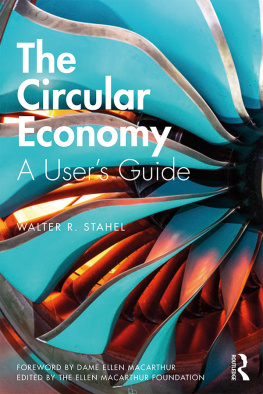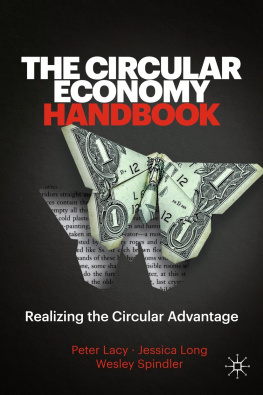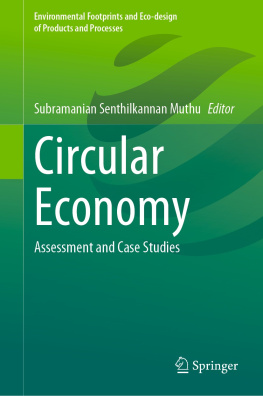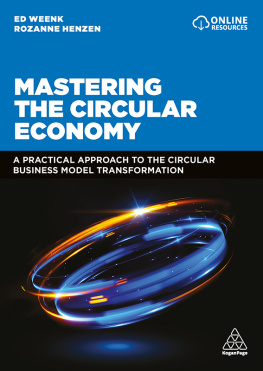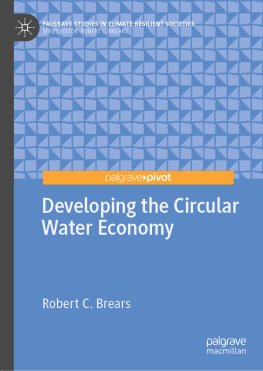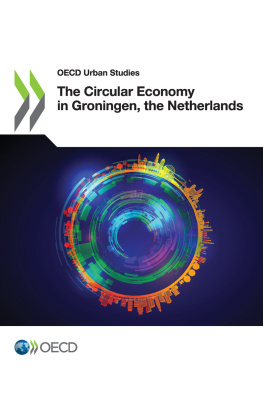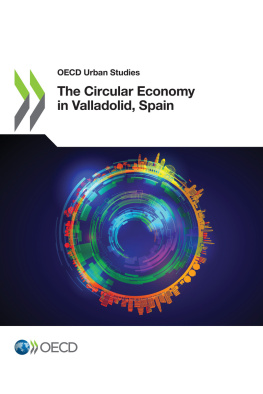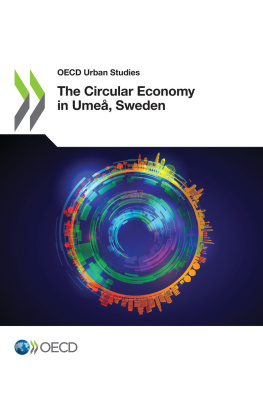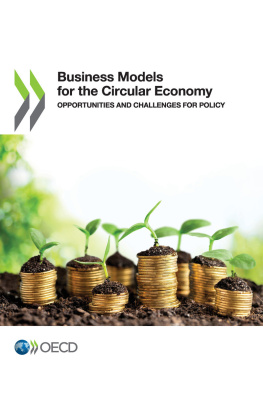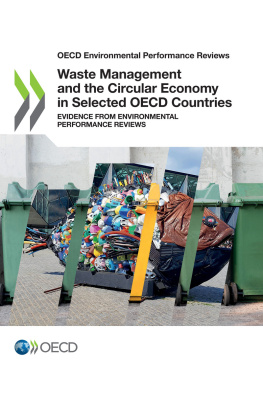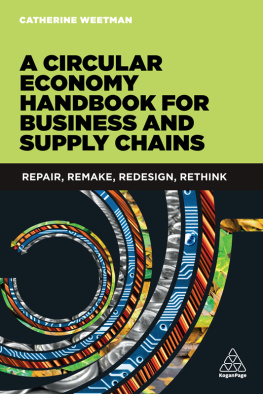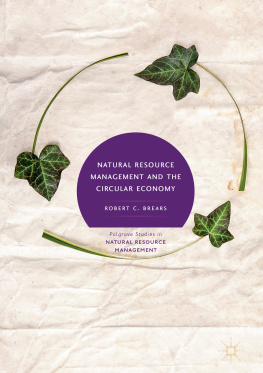Stahel - The circular economy : a user’s guide
Here you can read online Stahel - The circular economy : a user’s guide full text of the book (entire story) in english for free. Download pdf and epub, get meaning, cover and reviews about this ebook. year: 2019, publisher: Routledge, genre: Politics. Description of the work, (preface) as well as reviews are available. Best literature library LitArk.com created for fans of good reading and offers a wide selection of genres:
Romance novel
Science fiction
Adventure
Detective
Science
History
Home and family
Prose
Art
Politics
Computer
Non-fiction
Religion
Business
Children
Humor
Choose a favorite category and find really read worthwhile books. Enjoy immersion in the world of imagination, feel the emotions of the characters or learn something new for yourself, make an fascinating discovery.
The circular economy : a user’s guide: summary, description and annotation
We offer to read an annotation, description, summary or preface (depends on what the author of the book "The circular economy : a user’s guide" wrote himself). If you haven't found the necessary information about the book — write in the comments, we will try to find it.
Stahel: author's other books
Who wrote The circular economy : a user’s guide? Find out the surname, the name of the author of the book and a list of all author's works by series.
The circular economy : a user’s guide — read online for free the complete book (whole text) full work
Below is the text of the book, divided by pages. System saving the place of the last page read, allows you to conveniently read the book "The circular economy : a user’s guide" online for free, without having to search again every time where you left off. Put a bookmark, and you can go to the page where you finished reading at any time.
Font size:
Interval:
Bookmark:

A circular economy seeks to rebuild capital, whether this is financial, manufactured, human, social or natural, and offers opportunities and solutions for all organisations. This book, written by Walter Stahel, who is widely recognised as one of the key people who formulated the concept of the circular economy, is the perfect introduction for anyone wanting to quickly get up to speed with this vitally important topic for ensuring sustainable development. It sets out a new framework that refines the concept of a circular economy and how it can be applied at industrial levels.
This concise book presents the key themes for busy managers and policymakers and some of the newest thinking on the topic of the circular economy from one of the leading thinkers in the field. Practical examples and case studies with real-life data are used to elucidate the ideas presented within the book.
Walter R. Stahel is the Founder-Director of the Product-Life Institute (Switzerland), the oldest established consultancy in Europe devoted to developing sustainable strategies and policies. He is Visiting Professor in the Department of Engineering and Physical Sciences, University of Surrey, and a full member of the Club of Rome. He was awarded degrees of Doctor honoris causa by the University of Surrey (2013) and lUniversit de Montral (2016).
First published 2019
by Routledge
2 Park Square, Milton Park, Abingdon, Oxon OX14 4RN
and by Routledge
711 Third Avenue, New York, NY 10017
Routledge is an imprint of the Taylor & Francis Group, an informa business
2019 Walter R. Stahel
The right of Walter R. Stahel to be identified as author of this work has been asserted by him/her/them in accordance with sections 77 and 78 of the Copyright, Designs and Patents Act 1988.
All rights reserved. No part of this book may be reprinted or reproduced or utilised in any form or by any electronic, mechanical, or other means, now known or hereafter invented, including photocopying and recording, or in any information storage or retrieval system, without permission in writing from the publishers.
Trademark notice: Product or corporate names may be trademarks or registered trademarks, and are used only for identification and explanation without intent to infringe.
British Library Cataloguing-in-Publication Data
A catalogue record for this book is available from the British Library
Library of Congress Cataloging-in-Publication Data
Names: Stahel, Walter R., author.
Title: The circular economy : a users guide / Walter R. Stahel.
Description: New York : Routledge, 2019. | Includes bibliographical references and index.
Identifiers: LCCN 2019002504| ISBN 9780367200145 (hardback) | ISBN 9780367200176 (pbk.) | ISBN 9780429259203 (ebook)
Subjects: LCSH: Sustainable development. | Environmental policy. | Natural resources--Environmental aspects.
Classification: LCC HC79.E5 S6693 2019 | DDC 338.9/27--dc23
LC record available at https://lccn.loc.gov/2019002504
ISBN: 978-0-367-20014-5 (hbk)
ISBN: 978-0-367-20017-6 (pbk)
ISBN: 978-0-429-25920-3 (ebk)
The author thanks
Ian Banks
Mike Harrison
Nathalie Vercruysse
Ken Webster
for critical comments and reviews of the manuscripts,
Graham Pritchard for the reinvention of my graphics,
Andrew Clifton for researching and providing the book cover picture,
Lena Gravis for the editing work,
Rolls-Royce plc. for its courtesy in providing the author with a photograph for the book cover, which symbolises the beauty of product use and technological progress in a circular and performance economy, putting function over fashion.
The cover image is Copyright Rolls-Royce plc. All rights reserved. This copyright work has been reproduced with the kind permission of Rolls-Royce plc.
The foreword is Copyright of the Ellen MacArthur Foundation.
This book is a tool box for behavioural analysis; it is not a textbook of economics, molecular biology or material sciences, even if these disciplines are important to understand circularity.
This book appeals to common sense and attempts to explain the circular economy for those who see it as black box; it will therefore challenge experts knowledge. The working title of the book has been for a long time Circular economy for beginners.
No one has done more to make the case for the transition to a circular economy than my friend Walter Stahel. Not only because he has been doing it longer and with more care and humility than anyone else, but first and foremost because his words have proved to be just what our changing times need. His strength, his persistence, and a lifetime of reflection built on observing the worlds of business, design and manufacturing have culminated in this short book. Every page contains either something worth learning or an expression that will be picked up and shared. Books of that ilk are rare.
Walter set out to create a beginners guide, but his effort exceeded that objective, resulting in a discourse that brings clarity and precision to the sometimes-misconstrued concept of the circular economy.
For more than 40 years, Walter has been developing this idea, constantly renewing himself and exploring many paths. So, what does this this book reveal that we do not already know? It seems to me that for the first time Walter places the concept of circular economy in its historical context, and in doing so gives it greater depth and legitimacy. From a strategy to address resource scarcity, the circular economy has become an industrial model of development appealing to individuals as the most desirable and sustainable option.
Of course, the Performance Economy occupies a prominent place in this book, which is to be expected from the founding father of the concept. Walter insists on the importance of the notion of caring as a requirement in the Performance Economy which is based on a shared used of objects. Indeed, he stresses that the circular industrial economy overall relies both on caring and on trust.
Other concepts appear in this book and deserve attention, for example the idea of recovering molecules and atoms and reusing them at high levels of purity. A challenging new dimension of circular activities to be sure, but one full of the promise of economic and environmental benefits. There is no doubt that these new developments will be the subject of passionate debate among circular economy experts a group that is far more numerous than 40 years ago.
Reflecting on his work to date, Walter concludes that while he has provided useful descriptive tools, he may have failed to motivate people to start the necessary transition that longing for the sea he expresses using Saint-Exuprys words. I would beg to differ and encourage him to consider that the current enthusiasm for the circular economy idea owes a great deal to his influence.
Dame Ellen MacArthur

This book gives the reader an idea of the opportunities of the circular economy (CE), by describing circularity, its history, structure and mechanisms.
Circularity is the principle governing nature and a circular society, the latter enabled early mankind to overcome a scarcity of resources, people and skills by making the best use of the natural resources available; sharing and reuse were a necessity and the norm. When a castle became superfluous through political changes or a cathedral redundant, their structure was dismantled and the stones used to build new houses or bridges. This circular society has been mans best friend, omnipresent and discreet, for a long time, driven by scarcity.
Font size:
Interval:
Bookmark:
Similar books «The circular economy : a user’s guide»
Look at similar books to The circular economy : a user’s guide. We have selected literature similar in name and meaning in the hope of providing readers with more options to find new, interesting, not yet read works.
Discussion, reviews of the book The circular economy : a user’s guide and just readers' own opinions. Leave your comments, write what you think about the work, its meaning or the main characters. Specify what exactly you liked and what you didn't like, and why you think so.

